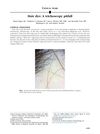 July 2023 in “Journal of ayurveda and integrated medical sciences”
July 2023 in “Journal of ayurveda and integrated medical sciences” Keshohills hair oil effectively reduces hair loss and treats dandruff.
 July 2023 in “International Journal of Cosmetic Science”
July 2023 in “International Journal of Cosmetic Science” Biopolymers are increasingly used in cosmetics for their non-toxicity and skin benefits, with future biotech advancements likely to expand their applications.
 13 citations,
July 2011 in “Photomedicine and laser surgery”
13 citations,
July 2011 in “Photomedicine and laser surgery” Coloring white hair before IPL treatment effectively helps remove it.
 July 2023 in “Biomolecules”
July 2023 in “Biomolecules” The new "whisker follicle microinjection assay" can test how different biomolecules affect hair growth and color.
January 2016 in “International archives of medicine” Hair coloring is strongly linked to hair damage and scalp problems.
18 citations,
July 2015 in “Journal of cosmetic dermatology” Straightening and coloring hair, especially with sodium hydroxide, greatly increases protein loss.
13 citations,
March 2010 in “International Journal of Cosmetic Science” Hair coloring increases copper and calcium uptake, damaging hair and reducing shine.
 11 citations,
February 2021 in “Trends in Food Science and Technology”
11 citations,
February 2021 in “Trends in Food Science and Technology” Impatiens plants have health-promoting compounds and are used for natural food coloring, but more research is needed to understand their full benefits.
25 citations,
January 2013 in “Colloids and surfaces. B, Biointerfaces” Hair dye colors mainly target melanin granules in black hair.
19 citations,
May 2010 in “Surface and interface analysis” 18-MEA is essential for hair's water resistance, and a conditioner with 18-MEA and SPDA can restore it.
 November 2016 in “PubMed”
November 2016 in “PubMed” Hair becomes thinner, grayer, and may fall out more as people get older, and styling habits can worsen these effects.
 51 citations,
July 2008 in “Dermatologic Therapy”
51 citations,
July 2008 in “Dermatologic Therapy” The document concludes that surgery is a preferred treatment for cicatricial alopecia, with the method chosen based on individual factors and may require multiple sessions and careful postoperative care.
1 citations,
October 2023 in “PloS one” Cosmetic hair treatments can increase hair testosterone levels, while natural hair color does not affect it.
 February 2021 in “Journal of the Korean Society of Cosmetology”
February 2021 in “Journal of the Korean Society of Cosmetology” Castor oil improves the texture of bleached hair by increasing its strength.
 January 2005 in “Seibutsu Butsuri/Seibutsu butsuri”
January 2005 in “Seibutsu Butsuri/Seibutsu butsuri” Chemical treatments damage hair more than UV exposure, making it thinner and less flexible.
 15 citations,
November 2015 in “Trends in biotechnology”
15 citations,
November 2015 in “Trends in biotechnology” Gene regulation could revolutionize hair color by altering pigmentation from within.
 8 citations,
May 2012 in “Clinical and Experimental Dermatology”
8 citations,
May 2012 in “Clinical and Experimental Dermatology” An 82-year-old woman's hair turned white suddenly, likely due to a rare form of alopecia that targets pigmented hair.
 6 citations,
March 2015 in “Journal of The American Academy of Dermatology”
6 citations,
March 2015 in “Journal of The American Academy of Dermatology” Hair dye can make it hard to diagnose scalp conditions correctly.
 5 citations,
April 2018 in “Chem”
5 citations,
April 2018 in “Chem” Graphene-based hair dye is a safe, durable, and effective alternative to traditional black hair dyes.
 July 2023 in “Journal of Indian System of Medicine”
July 2023 in “Journal of Indian System of Medicine” Ayurveda can help treat premature hair graying with lifestyle changes and herbal remedies.
 March 2021 in “International journal for research in applied science and engineering technology”
March 2021 in “International journal for research in applied science and engineering technology” Herbal hair dyes from tannin-rich plants are effective and safer than synthetic dyes.
 April 2012 in “Journal of the American Academy of Dermatology”
April 2012 in “Journal of the American Academy of Dermatology” Clofazimine effectively treated ashy dermatosis in a patient.
January 2010 in “Elsevier eBooks” Hair color is important in many fields and is measured for various purposes.
8 citations,
January 2018 in “Journal of cosmetic dermatology” Conditioners in hair dye reduce damage and improve combability.
210 citations,
May 2006 in “The FASEB journal” Oxidative stress causes hair to gray by damaging and killing pigment cells.
 4 citations,
January 2018 in “Urology & Nephrology Open Access Journal”
4 citations,
January 2018 in “Urology & Nephrology Open Access Journal” Hair dye chemicals can cause serious health problems, including kidney damage.
 February 2003 in “Journal of Cutaneous Medicine and Surgery”
February 2003 in “Journal of Cutaneous Medicine and Surgery” Fine hairs improve male pattern baldness treatment, alopecia areata causes remain unknown, and hair can recover from dye damage over time.
 4 citations,
June 2020 in “JAAD case reports”
4 citations,
June 2020 in “JAAD case reports” Permanent hair dye may cause total hair loss.
 1 citations,
January 2010 in “Elsevier eBooks”
1 citations,
January 2010 in “Elsevier eBooks” Any drug can cause skin reactions, but antibiotics, NSAIDs, and psychotropic drugs are more common, with some reactions being life-threatening.
 April 2024 in “Pharmacognosy research”
April 2024 in “Pharmacognosy research” The herbal hair dye with natural ingredients like henna was successfully made and tested, but more research is needed on its effectiveness on different hair colors and benefits.





















